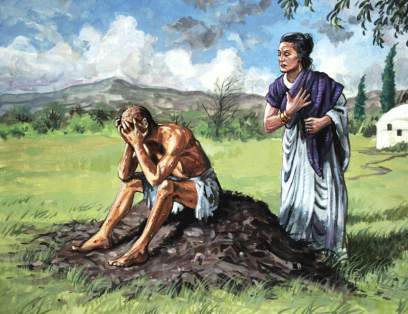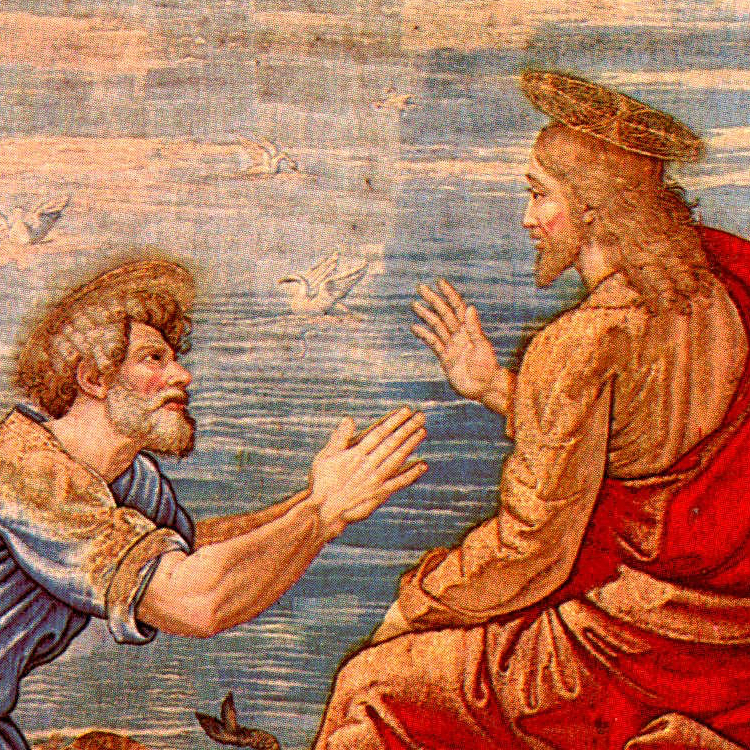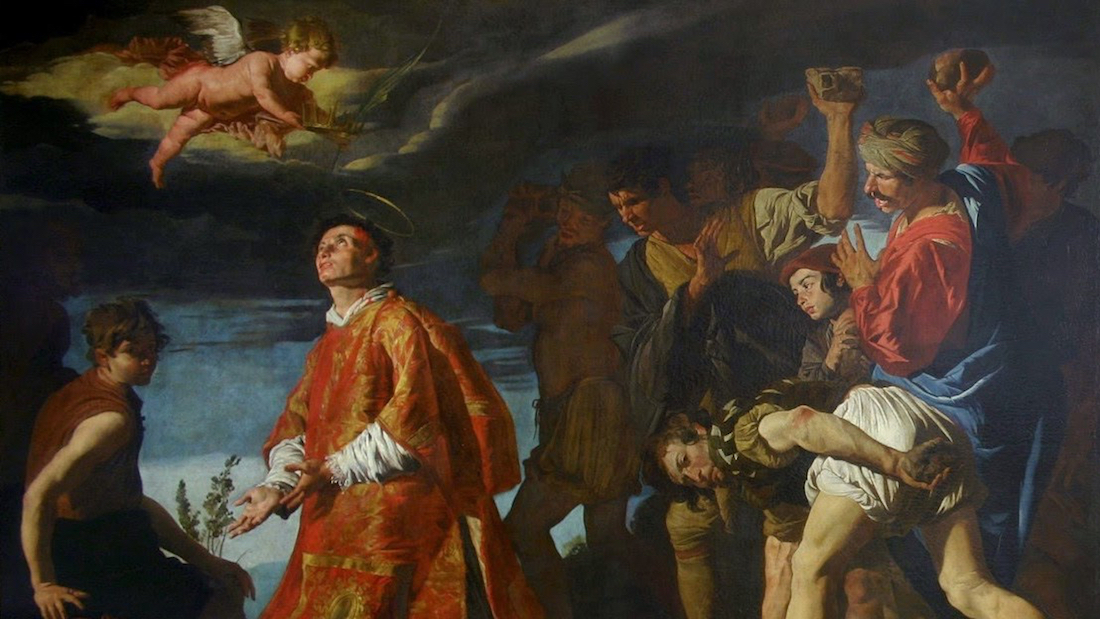
This week’s Gospel reading is taken from Mark, 1:29-39; and I call your attention to verse 34 which says:
…and He drove out many demons.
There are two things we need to realize as we read that verse. First of all, this verse appears at the very beginning of Mark’s Gospel. This is only the 34th verse of chapter one. Jesus has just called Peter, Andrew, James and John to come and follow Him. Mark says that after calling them, they all went to Capernaum. Mark says that Jesus taught in the synagogue there and immediately after doing so, they leave the synagogue and it is there that our reading begins. So this is the very beginning of Jesus ministry as recorded by Mark; and already the word “demon” or the phrase “evil spirit” has appeared seven times.
The second thing we need to understand is the fact that the words, demon, devil, or evil spirit are not isolated incidences in Scripture. These words appear 137 times in Sacred Scripture. And the idea of demon possession appears an additional 26 times in Scripture. I think that it is obvious that our God is calling our attention to something that He feels is very important, something that He wants us to be aware of, and something about which He wants to caution us. If we accept the fact that evil exists, in spirit form, in the world around us, then I think we also have to accept the fact that this presence can and does have a contributing influence on human behavior and on human history.
Having said that, I call your attention to the fundamental message of Sacred Scripture, the message proclaimed to the world by the very appearance of Jesus within our human history. This message is very simple, and it doesn’t require multiple degrees in theology to know and understand it. The message of Scripture can be summarized in three simple words.
God is Love.
As simple as that message is, “God is Love”, it provides us with a profound answer to some of life’s most perplexing questions. For example, why am I here, why do we have sin and evil in our world, and why is there pain and suffering?
We must understand that each and every one of us is here for one and only one purpose. We were blessed with this precious gift of life simply to know and to do the will of our Loving Heavenly Father.
That makes the purpose of life sound quite simple doesn’t it? But how am I to know what the will of God is for me in my life? If I am expected to do the will of God, then I must know exactly just what that will is, right? But how am I supposed to know that? How am I supposed to discern God’s will for my life? Well, the answer is really quite simple. Think about the fundamental message of Sacred Scripture, “God is Love”. In that message is our answer. As children of God, we are to love as our Heavenly Father loves. Our Heavenly Father doesn’t care about how much wealth or possessions we acquire in life. He could care less about our position or status in this world. What our Heavenly Father does care about, what He does expect from each and every one of us, His children, is that we recognize and accept His love; that we love Him in return, and that we reflect our love of God by loving and taking care of one another, for we are all sons and daughters of our Heavenly Father. That is the purpose of our existence. “Every person without exception is to be loved by us. This is the most difficult and most important lesson of our life. This is what has shaped the past events within our human history; and this is what will create our future.”[i]
If then the primary purpose of life is simply to love and take care of one another, why then are we as individuals and as a society doing such a poor job of it? We don’t have to look very hard to find countless examples of sin and evil, pain and suffering. The answer to the question of why we are doing such a poor job can be attributed to what we loosely refer to as our human nature. By human nature I am referring to ways of thinking, feeling and acting, that we humans tend to have naturally.
Looking at human nature philosophically, Plato and Aristotle said that the nature of mankind can be divided into two parts. One part is rational. We think and can understand reason. The other part is irrational. We have passions and desires similar to those found in animals. Therefore, as rational human beings, we can acknowledge the existence of both good and evil; and we can recognize any given human behavior or event as being either good or evil, rational or irrational.
Scripture tells us that we were created in the image and likeness of God. God is Love. God is all good. And God wants only what is best for His children. Therefore it is in our very nature to be loving and caring. But God created us with a free will. We have the ability to choose. He will not force us to love. That would be submission not love. Since it is in our very nature to be loving and caring, like our Heavenly Father, it would appear obvious that there must be some other influence that is hostile to our fundamental rational nature, an alien influence that occasionally leads us to make irrational choices.
How many of you remember a comedian by the name of Flip Wilson? He died in 1998 but he had a routine in which he would say, “The devil made me do it”. He used to portray a character named Geraldine. Geraldine would say, “The devil made me buy that dress. He pushed me into the store. He forced me to try on that dress. And he made me sign your name to that check. The devil made me do it.” That was funny and we would all laugh. But we laughed because we could relate.
We instinctively know that the spirit of God inspires love, goodness and harmony. We understand that hatred, evil and chaos are not of God. But we also know, from human history, that those things that are not of God do have, and have always had, a powerful influence on human behavior and on human history. It is therefore imperative that we understand that, as powerful as they may be, these demonic influences have no power over us whatsoever, except for the power that we give them.
But what about the things that are outside of our control, things like pain and suffering? How do we reconcile those things in light of a loving and caring God who wants only the best for His children? Well, today’s first reading provides us with some insight. Our first reading was taken from the Book of Job. In this reading, Job is clearly suffering miserably. In fact, the entire Book of Job is devoted to this mystery of Job’s pain and suffering. In the book, Job is pictured as being a good and righteous man, who for no apparent reason, begins to suffer all sorts of misery and misfortune. Job appeals to God for an explanation. “What have I done to deserve this?” And God answers Job, but in doing so God does not justify His actions to Job, but rather God reminds Job of His infinite, all knowing, and almighty power. And in the end Job is strengthened by his experience of suffering.
The lesson in the story of Job for you and me is that even the good may experience pain and suffering in this life. But we must not allow our faith and confidence in God to fall victim to this evil. We must remain faithful, for in the end our faithfulness will be rewarded. The mind of man can never fully comprehend the wisdom of God. But if we allow them to, the problems we encounter will only serve to broaden and deepen our awareness of God’s presence and power.
When we are faced with conflicting choices that would give direction to our behavior, actions, or decisions, we must perfect the art of listening to the still small voice of the Holy Spirit that abides within each and every one of us. For the voice of the Holy Spirit will always be recognizable. Remember, the voice of the Holy Spirit “[ii]always speaks to us of love, joy, peace, hope, patience, faithfulness, self-control, truth, generosity, and God.”
Today’s Gospel reminds us of the awesome power of Jesus. It demonstrates the authority that Jesus has over sickness, disease and evil. By our fidelity to the will of our Heavenly Father, by loving and serving our fellow man, and by maintaining our trust and confidence in the wisdom of God, we too can experience the strength and victory that only God can provide.
[i] “My Descent into Death” by Howard Storm, page 41. [ii] “My Descent into Death” by Howard Storm page 145








